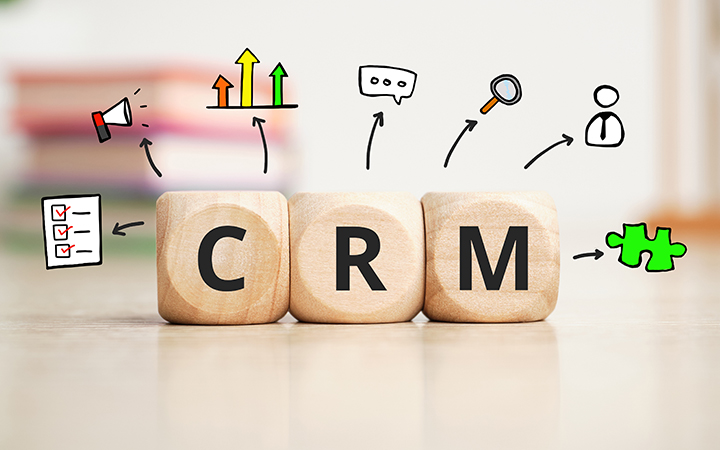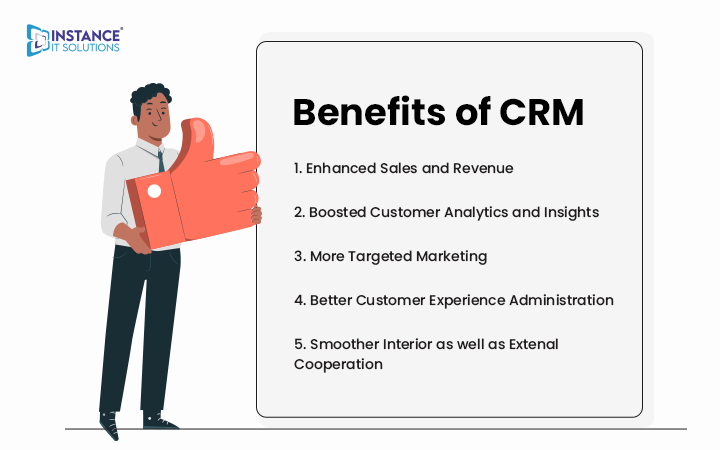CRM Definition: Benefits and Importance of CRM Software
-

-
Akshay Dhande
15 Feb, Wed
Content

introduction
Consumer connection monitoring (CRM) is a technology that evaluates and takes care of client communications and data throughout the customer lifecycle.Â
It's designed to build much better consumer experiences, boost customer service, and increase organization connections while increasing earnings.
The significance of CRM comes to be more clear when you think about it as a software program similar to a traditional declaring system in which the names of customers as well as prospects along with all of their pertinent details (phone number, email, deal phase, notes, and so on) are stored.
What does CRM mean?
CRM represents consumer partnership administration. Whenever people talk about CRM, they describe a CRM system-- an application that assists with call management, sales management, call-center representative efficiency, and much more.
Modern CRM systems can take care of consumer relationships throughout physical and electronic touchpoints, including-- but isn't limited-- to marketing, sales, business, and customer support.
What is a CRM system?
A CRM system is a software program for successfully handling a firm's communications with existing and prospective clients.
CRM systems aid in boosting client relationships and also connections by offering a 360-degree sight of the consumer with very easy accessibility to information like getting in touch with information, customer care requests, advertising and marketing campaigns, and sales history as well as possibilities, consequently streamlining companies' procedures.Â
It analyses a consumer's background with a company to gain essential understanding and chances.
The goal here is simple: enhance company relationships, boost conversions, and boost retention rates.
The quality of your product matters when it pertains to lasting consumer loyalty, yet so does your customer care.
- How well are you enlightening your new customers on utilizing your product?
- Exactly how promptly are you replying to their concerns?
- Are you doing anything to expect their concerns as well as concerns in a proactive, instead of responsive, way?
This matters to customer retention and is why brands spend greatly on CRM systems (or client relationship monitoring systems).
What are the benefits of CRM?
The advantages of a CRM system are unlimited and cause boosted customer loyalty and also engagement in addition to better ROI.
Let's examine just a few of the top benefits of using CRM:
1. Enhanced sales and also revenue
A next-generation customer partnership administration system can enhance sales and profits with integrated devices offered for sale force automation, lead monitoring, sales forecasting, cross-selling, ecommerce, and much more.Â
This makes the most of visibility into your sales pipe and offers sales representatives access to key details in real-time.
2. Boosted customer analytics and also insights
Using consumer information, representatives can access deep insights. The best software application solutions allow you to run real-time client analytics to promptly determine and confiscate brand-new sales opportunities, manage very reliable advertising projects, and wow consumers with personalized solutions.
3. More targeted marketing
Whether your emphasis is social network marketing, email advertising, or project administration, using the ideal program permits you to reach the right people with the right message at the right time.
It's a great means to learn more about your clients and deliver extremely targeted marketing on their network of choice.
4. Better customer experience administration
Wanting to improve customer support? Modern CRM software application provides contact center associates and area solution specialists with a 360-degree view of clients and automated pointers to settle concerns on initial get-in touch.Â
This has the effect of improving consumer contentment as well as loyalty with much better omnichannel experiences, including social networks.
5. Smoother interior as well as external cooperation
The term "collaborative CRM" defines how software enables a company to share information among groups, departments, and internal and external stakeholders.
Every person can access the most current info, so consumers never need to duplicate themselves-- even if they leap between departments. This improves the consumer journey and also experience.
Â
Why does local business require CRM?
Companies of all dimensions face many of the same issues concerning connecting with existing and potential consumers.
Regardless of how big or tiny, every service needs to contend with the difficulties in today's electronic world, where consumers locate what they want with Google searches, online testimonials, and social media blog posts.
From mom-and-pop shops to the Fortune 500, no business can be obsequious when faced with savvy, connected customers that can change to a rival with one quick click.
Additionally, it matters not how many staff members you have when it involves customer service. All organizations should cultivate customer loyalty.
A Gartner research study found that if clients have an easy or low-effort experience with a brand name, they're 94% more likely to buy once again. The more you recognize your client-- which goes to the heart of CRM-- the easier this becomes.
With the right CRM, you can provide your brand name assurance and create, construct, and sustain long-term relationships with your consumers.
Why is a CRM software program far better than a spreadsheet?
CRM is all about gathering data that can be utilized to obtain insights concerning existing and also prospective customers, aiding brand names to cater to their demands.
Whether the firm's internet site, telephone, social networks, web pages, email, or live conversation, consumer information insights become priceless nuggets that aid relative bargains, increase sales, and delight devoted customers.
Extremely local businesses may start taking care of CRM via Excel spreadsheets or a few other hands-on systems. In time, though, this ends up being unsustainable for many.Â
Not only is it time-consuming, but the data might be inaccurate and does not integrate with other systems a small business may use, such as bookkeeping.
With a cloud-based CRM, small companies don't need to fret about IT concerns, software program maintenance, backup, updates, or other expenditures. They can also deal with other online devices to instantly draw in relevant details, such as consumer account information or information concerning how leads discovered the business. These devices may also be available month-to-month, so local businesses don't have to commit to long-lasting.
5 questions to ask when selecting a CRM
The kind of CRM system you pick for your company will depend on the features and extensions you require beyond the core CRM functionality.
When reviewing CRM solutions, you'll be required to experience an ask-for proposal (RFP) procedure. During this procedure, you'll have the opportunity to ask comprehensive concerns regarding the system and get demonstrations to contrast your choices side-by-side.
Right here are 5 essential questions to ask:
1. Is the CRM user-friendly?
CRM is no help if it's clunky to utilize, and running records end up being a workout in aggravation. Make sure it's simple, easy to browse, and user-friendly.
2. Does the CRM software application assistance you obtain more arranged?
The tool must make it easy to access information anywhere, anytime on any gadget, while keeping data constant and upgraded throughout networks.
3. Does the CRM provider offer training?
Whether you are using a CRM for the first time or working to take your use of the software application to the following degree, you need to have many training opportunities on your selected device.
4. Does the CRM aid you in delivering individualized experiences?
Customizing messages and web content to the certain activities of potential customers and consumers is now table stakes for any service. That's a basic feature of CRM, so ensure you can conveniently benefit from it.
5. Does it incorporate with your other applications?
Modern cloud-based CRM devices commonly have native integrations within the software, making it easy and also very easy to immediately draw in data from your email system, accounting tool, appointment scheduler, and more.
You'll want to ask for consumer instances within your sector in the RFP. Even better, ask the CRM supplier to get in touch with info on those brand names so you can call them and inquire particularly about what they like or do not like about the tool.
We are trusted by over 650+ clients.
Join them by using our services and grow your business.
Request a callbackRequest a callback


 Contact Us
Contact Us
